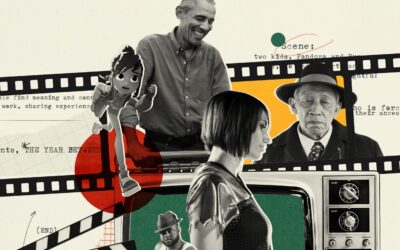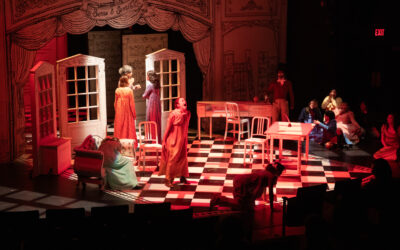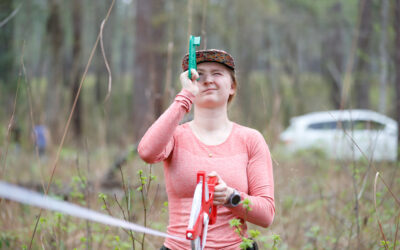On January 15, the Concord Academy community gathered, as it does every year on Martin Luther King Jr. Day, for a day on, rather than a day off — one of reflection on civil rights struggles and their legacy. A documentary film, talks, and workshops reinforced the importance of empathy, of understanding the world from other points of view, and drove home the message that to stand up for human rights, we must not let our discomfort stop us from speaking up.
In his opening remarks, Assistant Head of School and Academic Dean John Drew urged students to take responsibility for creating the change they would like to see in the world. “In this moment, we will be disappointed if we look to national leadership for decency, respect for self and others, honesty, compassion, or courage,” he said. “I would suggest one starting place is right here, in this community, and in particular on this day.” He encouraged students, faculty, and staff to listen to and learn from each other, to stay open-minded, and to acknowledge the limits of individual understanding throughout the day’s challenging programming.
Assistant Dean for Community and Equity Laura Twichell ’01 then introduced filmmaker Ava DuVernay’s documentary 13th. This powerful film explores the intersection of race, justice, and mass incarceration in the United States. View the trailer.
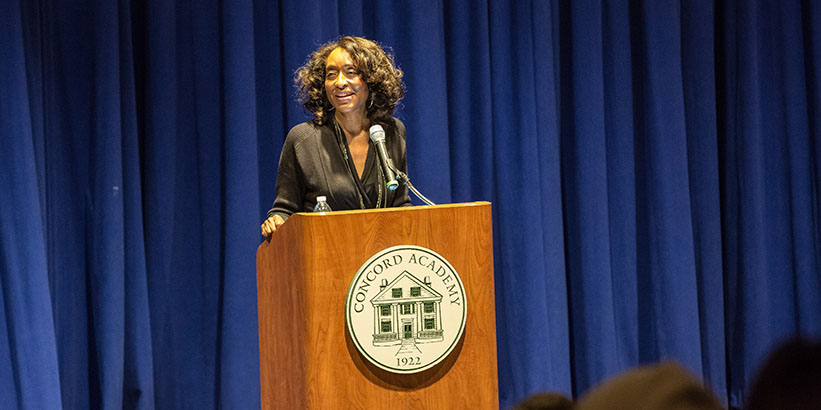
Keynote Address
Following the film showing, Adriene Holder, attorney-in-charge of the civil practice of The Legal Aid Society — and godmother of Wilcox Fellow in history Bajia Reed — took the podium in the Performing Arts Center for an impassioned and thought-provoking keynote address. From her vantage point as a lawyer at the oldest and largest nonprofit legal services organization in the country, dedicated since 1876 to providing quality legal representation to New Yorkers, she sees recent national policy changes as an “assault on humanity.”
“It’s racist, what’s coming from the White House,” Holder said. “We know words matter and have a great impact on creating policies we’ll have to live with.” Many immigrants to the United States are concerned right now, she said, and with good reason. She recounted the case of a client she is defending from deportation proceedings. Born in Trinidad, this green card holder and legal permanent resident settled in Queens, N.Y., with his family at the age of 18 months. At 45 years old, now a married MTA subway driver raising three children, he traveled to Trinidad for his grandmother’s funeral and was detained on his return because of charges that had been resolved more than 25 years ago. After exhausting their savings with a private attorney, his wife turned to The Legal Aid Society.
“Because of our confusing laws and policies, he would be separated from his family,” Holder said. “Does that sound like what should happen in this country? I think we are better than that.”
Addressing the documentary that students had just seen, Holder paused frequently to encourage dialogue and invite comments from students, questioning them about attitudes toward restorative justice and ideas for addressing systemic racism in this country. She argued that we must “push ourselves to be fearless in a time of real confusion and ugliness.”
“What do we do when we’re uncomfortable?” she asked. She sympathized with a student of color who expressed fatigue with representing his racial perspective, but she spoke to how her thinking has shifted because she is also an ally of other marginalized groups. She urged students to educate themselves, to use facts when engaging in difficult conversations — not to alienate, but to educate — and to question when they hear others express opinions that are not based in love.
Ending on a note of hope, Holder cited several hard-fought victories of The Legal Aid Society that became models for other states: establishing a 24-hour arrest-to-arraignment process, the right to shelter for homeless people, children’s rights to attorneys in family court, and combating racial discrimination in public housing. She’s proud of those achievements, but she doesn’t forget that many had argued against ruffling feathers along the way. “It’s nice when it’s in hindsight, but at the time it was extremely uncomfortable,” she said. “There are times when you’re feeling tired and alienated. And that’s OK.” Holder advised students to find allies because the difficult times are the most important times to effect change. “You can’t be silent,” she said. “Join in the chorus. Or become part of the debate.”

Workshops
An afternoon of faculty- and student-led workshops followed Holder’s address, many of which asked participants to examine social issues through intersectional lenses. Topics included racial identity mapping, labor injustice, family dynamics, gender discrimination, classism, and more. Students from the Public History and Multimedia Exploration: African American Life in Concord course gave tours of the Robbins House, a local museum of African American history. And theater teacher Shelley Bolman brought his company Theatre Espresso to campus for The Nine Who Dared, an interactive historical drama about the 1957 crisis in school integration in Little Rock, Ark.
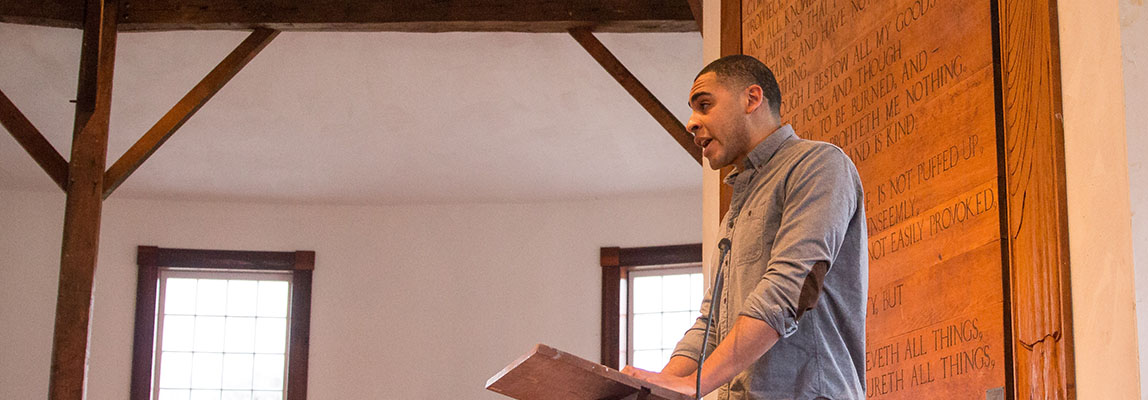
Closing Chapel
The day closed with a chapel talk by Josh Reed-Diawuoh ’09, who works as a senior associate at Third Sector Boston, a nonprofit advisory firm that takes a rigorous approach to tackling poverty and inequality — the “hard and nuanced work,” as he said, of addressing injustice. A self-proclaimed “military history nerd,” he said he recognizes the danger as well as the comfort in viewing history from a distance. Jim Crow didn’t end in the 1960s, he said, and racism, homophobia, and sexism continue as “insidious institutions of social control.”
In 2018, he said, we must examine how complex forces “confine some to poverty while propping others up.” We must also study what approaches are expanding opportunities and creating a more just and peaceful society.
Reflecting on Martin Luther King Jr., he cited as one the civil rights leader’s enduring lessons the “moral duty to step outside our comfort zones, to search for empathy, and to refuse to accept the status quo.” He closed his chapel with the hope that the programming of the day — and every day in this school — would inspire the next generation of leaders from CA.
